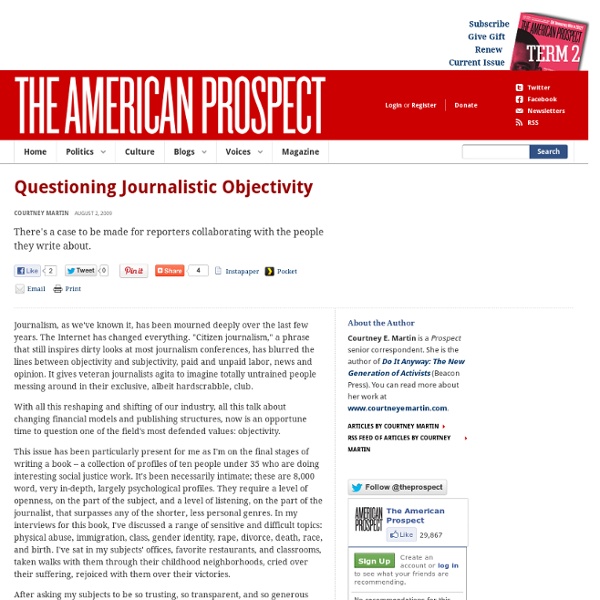Objectivity in Journalism
DAVID BROOKS There is some dispute about whether objectivity can really exist. How do we know the truth? Well, I’m not a relativist on the subject. I think there is truth out there and that objectivity is like virtue; it's the thing you always fall short of, but the thing you always strive toward.
What is objectivity in journalism?
Objectivity is expressing or dealing with facts or conditions as perceived without distortion by personal feelings, prejudices or interpretations. Objectivity, as defined by the school of media ethics, means standing so far from the community that you see all events and all viewpoints as equally distant and important or unimportant for that matter. It is employed by giving equal weight to all viewpoints—or if not, giving all an interesting twists, within taste. The result is a presentation of facts in a true non-partisan manner, and then standing back to let the reader decide which view is true. By going about it this way, we are defining objectivity not by the way we go about gathering and interpreting the news, but by what we actually put in the paper.
Bob Schieffer, Ron Paul and journalistic "objectivity" - Glenn Greenwald
CBS News‘s Bob Schieffer is the classic American establishment TV journalist: unfailingly deferential to the politically powerful personalities who parade before him, and religiously devoted to what he considers his own “objectivity,” which ostensibly requires that he never let his personal opinions affect or be revealed by his journalism. Watch how thoroughly and even proudly he dispenses with both of those traits when interviewing Ron Paul last Sunday on Face the Nation regarding Paul’s foreign policy views. You actually believe 9/11 was America’s fault? Your plan to deal with the Iranian nuclear program is to be nicer to Iran? This interview is worth highlighting because it is a vivid case underscoring several points about the real meaning of the much-vaunted “journalistic objectivity”:
Principles of Journalism
The first three years of the Project’s work involved listening and talking with journalists and others around the country about what defines the work. What emerged out of those conversations are the following nine core principles of journalism: 1. Journalism’s first obligation is to the truth Democracy depends on citizens having reliable, accurate facts put in a meaningful context. Journalism does not pursue truth in an absolute or philosophical sense, but it can–and must–pursue it in a practical sense.
Objectivity v Transparency - does journalism need a new ideology?
What is the hallmark of good journalism? Objectivity would be one of the standard replies: neutral journalism that is not partisan and that steers clear of disseminating personal opinions. Actually, the answer is just not quite as simple as that. Hang on to your hats, people, it's time for an ethics class... Wait a second, I hear you cry, before you take me back to journalism school - what's wrong with objectivity? Here's the thing: now it's obligatory for every journalist to have their hand hermetically sealed to a smartphone so they can dutifully maintain a Twitter account.
Martha Raddatz and the faux objectivity of journalists
Numerous commentators (including me) were complimentary of the performance of Martha Raddatz as the moderator of Wednesday night's vice-presidential debate. She was assertive, asked mostly substantive questions, and covered substantial ground in 90 minutes. That's all true enough, but the questions she asked reveal something significant about American journalism in general and especially its pretense of objectivity. For establishment journalists like Raddatz, "objectivity" is the holy grail.
An Argument Why Journalists Should Not Abandon Objectivity
In “Losing the News: The Future of the News that Feeds Democracy,” published by Oxford University Press, Alex S. Jones, a 1982 Nieman Fellow and director of the Joan Shorenstein Center on the Press, Politics and Public Policy at Harvard University, describes in its prologue his purpose and intent in writing about the “genuine crisis” in news. “It is not one of press bias, though that is how most people seem to view it,” he contends.
The Myth of Objectivity in Journalism
by This page has been accessed since 29 May 1996. The oft-stated and highly desired goal of modern journalism is objectivity, the detached and unprejudiced gathering and dissemination of news and information. Such objectivity can allow people to arrive at decisions about the world and events occurring in it without the journalist's subjective views influencing the acceptance or rejection of information. Few whose aim is a populace making decisions based on facts rather than prejudice or superstition would argue with such a goal.
Rethinking Objective Journalism
July 8, 2003 | Like this article? Join our email list: Stay up to date with the latest headlines via email.



